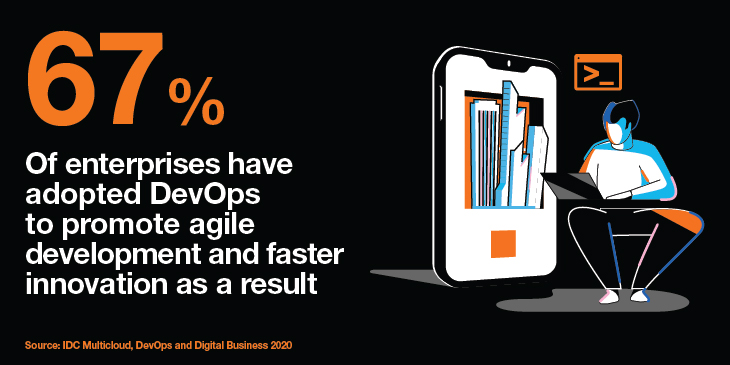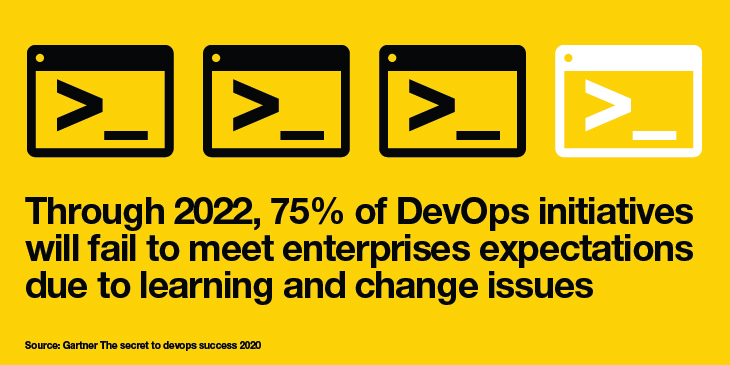The pressure is on for organizations to innovate and rethink the way they operate both internally and externally to transform and get a competitive edge in an increasingly aggressive digital economy. Ninety-three percent of large enterprises have now adopted multicloud, according to IDC. Currently, 67% of enterprises have adopted DevOps to promote agile development and faster innovation as a result. By 2024, the analyst firm estimates that 80% of new applications will be developed using a programming language that will be deployed in containers.
However, there are still challenges ahead. DevOps is built on collaboration, active feedback and automation. Yet enterprises are still failing to get the right building blocks in place, and this results in failure. Gartner predicts that through 2022, 75% of DevOps initiatives will fail to meet enterprises expectations due to learning and change issues.
The issue is that many enterprises often undertake DevOps initiatives without considering business outcomes or engaging employees and don’t take an iterative approach in focusing on continual improvements, maintains Gartner. Also, their expectations are often unrealistic and need to be better managed.

Making the DevOps and cloud relationship work
In our experience, there are essentially two types of enterprises that are looking to take the DevOps journey. There are those who are discovering the cloud and are looking to improve their applications and development processes. Then there are those enterprises that have already established cloud competencies and want to push the barrier further.
In both cases, the business outcomes are the same. They do not want to be uberized by new market participants and want to be able to develop applications and services rapidly to make their business more resilient and optimize existing IT performance and costs.
Using DevOps will make your development teams more agile and productive and more responsive to market changes. However, you can’t adopt DevOps and go, because the process takes time and new skills. The cloud maturity of the organization will also dictate what needs to be put in place.
Regardless of where an organization is on its DevOps journey, DevOps teams need to share a number of basic practices. These include a shared responsibility for operational standards, source code control, testing, integration and application delivery.
As organizations progress on their DevOps journeys, they will need to focus on automation and continuous improvement. This transformation will require a cultural shift, including top-down sponsorship, trust in DevOps teams, design for autonomy and empowerment, improvement through testing and measuring, and rewarding results that are aligned to business outcomes, not compliance, according to McKinsey.
DevOps: becoming autonomous
The road to DevOps might seem overwhelming at times for some organizations who can’t see clearly where to start. Those further on their journeys often find that after setting up a DevOps team and adopting continuous delivery practices, processes aren’t as efficient as they expected. This is where autonomy comes in and the concept of self-governance. In autonomous DevOps teams, each member is empowered to make decisions based on the scenario in question and resources available.
Orange Business recommends five steps to becoming autonomous:
- Undertaking a cloud maturity audit and assessment for cloud migration
- Outlining and adopting the right migration strategy for applications, including mission-critical ones
- Establishing a design target for applications that take advantage of cloud in terms of performance and costs
- Securing the cloud transition, regardless of the customer’s design target
- Optimizing through continuous improvement
A cloud readiness assessment provides an overview of cloud maturity, applications installed, servers, OS and middleware to integrate into the cloud. This helps organizations build custom roadmaps towards effective hybrid IT aligned to objectives and advance up the maturity model.
We can also help organizations that are looking to adopt DevOps to understand the technical and cultural requirements required to deliver on a DevOps framework. With the ability to fail fast and recover quickly, DevOps will enable rapid innovation, testing and deployment if done properly.
Many organizations find that once they have adopted DevOps, scaling proves a major challenge, such as transferring from rigid to cross-functional teams to speed up innovation, enforcing company policies without slowing down development and understanding the costs. Essentially, DevOps doesn’t cut costs as much as it grows revenue.
DevOps also is an integral part of any organization’s cloud-native strategy. Cloud native is core to bringing innovation to market faster. The practice of automating processes between development and operations teams is fundamental to this. Cloud-native DevOps will enable development teams to further exploit the automation and scalability of cloud-native technologies, such as containers and Kubernetes.

FinOps: managing your cloud spend
Talking of cloud spend, financial operations (FinOps) has fast risen as convergence between people, processes and technology. The FinOps Foundation defines it as “the practice of bringing financial accountability to the variable spend model of cloud, enabling distributed teams to make business trade-offs between speed, cost and quality.”
When organizations adopt cloud, they soon find out how easy it is to consume services. FinOps is the answer to managing cloud costs. Here at Orange, we can help organizations to control and optimize their monthly invoices as well as breakdown projects by costs. We integrate it into all processes, including the design, build and run phases, so you only pay for the resources you need and consume.
We start with a complete audit of your organization’s cloud estate, including checking infrastructure sizing and geographical areas. If the VMs you are using are too small, for example, you will not be getting the performance you need. If they are too big, you will be paying too much to run them, for example.
By working with Orange, organizations can optimize their IaaS budget coupled with operational excellence. At the same time, a roadmap can be put in place to achieve short and long term objectives. This is achieved via a number of offerings, including recommendations for reducing recurring costs, monthly analysis reports of different clouds and identifying optimization possibilities, including performance and resources.
The reassurance of cloud expert services
The cloud environment is changing fast. DevOps and FinOps are becoming the norm, and those ahead of the curve are already using cloud-native DevOps. This transformation can be a challenge for many organizations in terms of in-house skills, knowledge and the demands made on changing organizational cultures, for example.
Cloud expert services such as those offered by Orange Business provide organizations with the help to quickly unlock the business value of cloud and help them move up the cloud maturity scale faster.
Kerlink simplified its international deployment using a multi-cloud business application. Find out how in this case study.

Passionate about innovation in all its forms, with more than 15 years of experience in consulting, telecoms, IT and the cloud in general, I am involved in the design and implementation of IT services offers within Orange Cloud for Business. My everyday aim is to support customers in the implementation of their digital transformation projects and to help them develop their skills to become autonomous and efficient in their business.